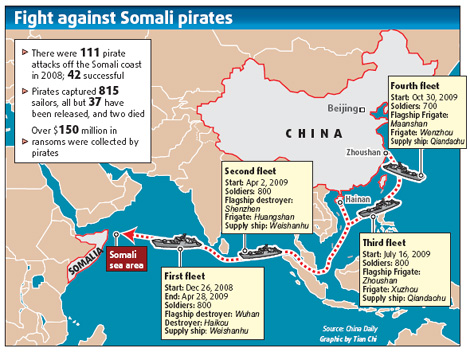Foreign and Military Affairs
Anti-piracy special: Calming troubled waters
By Li Xiaokun and Peng Kuang (China Daily)
Updated: 2009-12-29 08:02
 |
Large Medium Small |
More than 30 percent of China's foreign trade travels via this route, according to official figures.
"It is a lifeline for our energy and foreign trade. We must exercise our ability to protect it," said Rear Admiral Yin Zhuo, a senior researcher with the PLA Navy Equipment Research Center in Beijing. "The action also shows the world that China is able to send its troops to protect its core interests around the globe."
The missions, which have set many records for China's military, is also a milestone for the navy's development, said Song Xiaojun, a Beijing-based independent military expert. "The task was the best exercise opportunity for the Chinese navy, which has long stuck to a surrounding sea defense policy," he said.
Liu Xiaojiang, the navy's political commissar, noted when seeing the first escort off last year that it was "a historic step" for the Chinese navy to head toward a Blue Water navy, which is capable of operating across deep oceans.
Despite the relative success of international efforts, piracy is still rampant in Somali waters, with 11 attacks reported this month alone.
Pirates have seized more than $50 million through attacks this year, according to official figures, and are currently holding hundreds of hostages from 13 vessels.
The UN Security Council agreed on Nov 30 to extend the mandate on efforts to combat pirates by 12 months to late 2010.
"China recently suggested dividing the convoy range into pieces and every country look after its own to improve efficiency," said Yin at the PLA Navy Equipment Research Center.
Experts have also urged the UN to push forward peacekeeping missions in Somalia to help stabilize the country, which has an unemployment rate of 70 percent that many say is fueling recruitment by pirate gangs.
"The Somali piracy is at sea but the root is on the land," added Cao Weidong, a researcher with the Military Academic Research Institute of the PLA Navy. "To solve the problem we cannot merely depend on military ways, although the task of the Chinese navy in the Somali waters is unlikely to cease in the short term."












